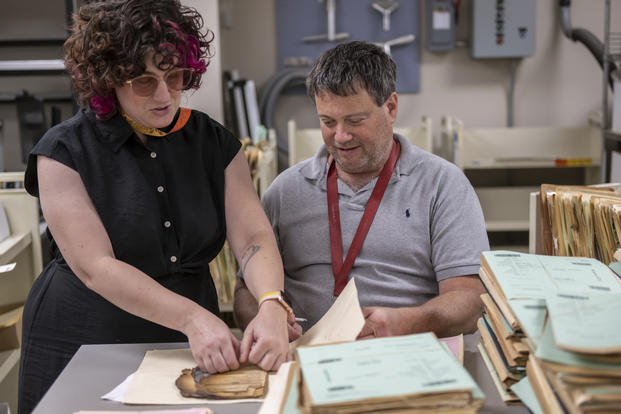A backlog of hundreds of thousands of requests for veterans records from the National Personnel Records Center in St. Louis that was caused by limiting in-person work during the COVID-19 pandemic has finally been cleared, the National Archives announced this week.
"Clearing the backlog of record requests at the National Personnel Records Center has been my top priority, and I am proud that we've gotten this done," Archivist of the United States Colleen Shogan said in a statement Wednesday. "I want to recognize the hard work and dedication of the National Archives staff. They have worked overtime and across weekends and holidays to achieve this goal and ensure we meet our obligation to those who've served."
While the National Personnel Records Center, or NPRC, never fully closed down during the pandemic so that it could respond to emergency requests such as for records needed for medical care, it significantly curtailed operations because of building occupancy limits.
Read Next: Yearslong Delay in Covering Transgender Surgeries Prompts Lawsuit Against VA
The staffing reductions led to a backlog that grew to more than 600,000 requests, making life difficult for veterans who needed hard copies of their records for disability claims, proof of veteran status for other benefits, documentation in lawsuits, personal archives and other uses.
Officials were able to eliminate the backlog through a mix of updating technology, adding staff and contractors, and working longer hours, according to Wednesday's news release.
Lawmakers, who previously expressed immense frustration at the backlog, are also crediting a law passed by Congress in 2022 that authorized $60 million for the National Archives to address the issue and mandated the agency issue a concrete plan to clear the logjam.
"If veterans cannot access their service records, they cannot claim and receive the benefits and care that they've earned through their service," Sen. Jon Ossoff, D-Ga., said in a statement Thursday. "That's why I wrote and passed the bipartisan Access for Veterans to Records Act, which required the National Archives to clear out this backlog. This is great progress with more work ahead."
Sen. Mike Rounds, R-S.D., the bill's other lead sponsor, similarly said he was "pleased" the "unacceptable" backlog "has been remediated so veterans can acquire their records in a timely manner."
"I will continue to work with my colleagues on both sides of the aisle to make certain our veterans have access to the services and benefits they have earned," he said in a statement Thursday.
With the backlog eliminated, veterans can expect routine requests for separation documents to take less than a week to process, while more complex applications could take about 20 days, according to the National Archives news release.
The Archives also said it is continuing to work on digitizing records after entering into multiple agreements with the Department of Veterans Affairs to expedite that process.
"I have worked for the National Archives for 35 years and the pandemic and subsequent backlog presented the greatest challenges of my career, but they also led to many fast-paced, transformative changes, particularly with regard to transitioning NPRC's holdings and processes to an electronic environment," Scott Levins, the center's director, said in a statement. "We are routinely doing things today that were seemingly impossible before the pandemic and which position us for success for years to come."
Related: 'Significant Anxiety and Hardship:' 233 Lawmakers Call for Military Records Processing to Resume












